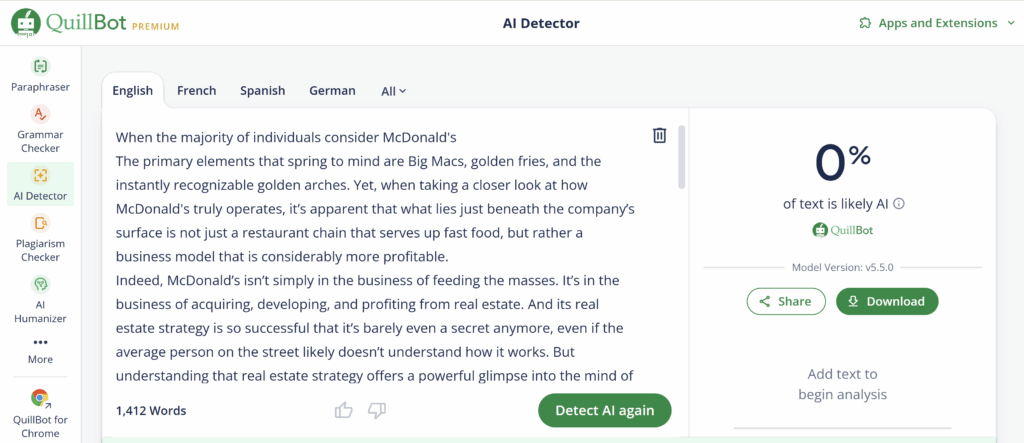When the majority of individuals consider McDonald’s
The primary elements that spring to mind are Big Macs, golden fries, and the instantly recognizable golden arches. Yet, when taking a closer look at how McDonald’s truly operates, it’s apparent that what lies just beneath the company’s surface is not just a restaurant chain that serves up fast food, but rather a business model that is considerably more profitable.
Indeed, McDonald’s isn’t simply in the business of feeding the masses. It’s in the business of acquiring, developing, and profiting from real estate. And its real estate strategy is so successful that it’s barely even a secret anymore, even if the average person on the street likely doesn’t understand how it works. But understanding that real estate strategy offers a powerful glimpse into the mind of McDonald’s corporate leadership and how it has managed to remain a global powerhouse for decades.
Let us closely examine how McDonald’s constructed its wealth from real estate, not hamburgers.
The Real Secret Sauce: McDonald’s Real Estate Business Model
McDonald’s operates primarily as a franchisor. According to the company’s 2025 annual report, approximately 93% of its global restaurants are franchised. What sets McDonald’s apart, though, is this: It doesn’t merely grant franchises and then sit back and collect the franchise fees. It also owns the land and buildings where most of its franchisees do business.
Franchisees generally obtain their property through a lease from McDonald’s, paying rent that typically hinges on a percentage of sales. This rent, then, is calculated on sales above and beyond the expected normal volume.
Other franchises pay to be part of the system. McDonald’s makes profits, regardless of how the restaurants perform. Even if the franchise can’t make a go of it, McDonald’s collects rent on its building and on its brand.
This strategy enables McDonald’s to keep deriving reliable revenue from real estate even as it ceaselessly expands the brand via franchise partnerships. It’s a win-win that has made the company one of the most successful in history.
How Big Is McDonald’s Real Estate Portfolio?
In 2025, McDonald’s will operate more than 45,000 restaurants across the globe. The company’s own filings indicate it owns the land and buildings for about 70% of its stores. This means that McDonald’s has lots and lots of real estate; its real estate holdings are worth billions of dollars.
Indeed, certain analysts have put the figure at more than $40 billion, making McDonald’s real estate portfolio worth as much as some of the largest REITs. And it’s worth noting that this is real value, not paper value, given the amount of cash that McDonald’s generates from its real estate.
McDonald’s has this rare kind of financial security. When the economy slows or food trends shift, the real estate income keeps flowing. It’s why the company has been able to weather not just the ’08 downturn but also the COVID-19 pandemic better than many competitors. Should we give its business model some thought?
The Role of Ray Kroc: A Visionary Who Saw Real Estate Gold
The real estate strategy of McDonald’s goes back to the early days of the company. Ray Kroc, the man who turned McDonald’s into a global empire, soon figured out that the real money was not in selling hamburgers but in owning the land underneath them.
Kroc and his financial advisor, Harry Sonneborn, separate from McDonald’s in 1956, Kroc and Sonneborn set up a new company to buy land for McDonald’s franchisees. They called this new firm Franchise Realty Corporation. It did a pretty simple thing: it bought land, and it did a pretty smart thing: it leased the land to franchisees. McDonald’s franchisees paid for the operations. They paid for the cheeseburgers, the French fries, and everything else that went inside the restaurant. But they didn’t pay for the land.
This method made McDonald’s a mixed model; part a series of restaurants, part a real estate firm. And this very same model is the basis of the McDonald’s real estate strategy today.
Why the McDonald’s Real Estate Model Works So Well
- Prime Locations: McDonald’s has a talent for selecting places that have a lot of people passing by and a lot of people seeing them. These places not only sell a lot of food but also tend to become more valuable over time. That’s what you call a win-win.
- Long-Term Leases: Franchisees are typically given franchise agreements to sign. These agreements along with the lease of the premises (which often is made part of the agreement) can run bad times for the franchisees for 10 years or more. Most leases for the businesses involved in the court cases were for much more than 10 years. Usually enter into 20-year lease agreements, which provide McDonald’s with a reliable stream of income for many years. This is for the most part the same with Burger King. Taco Bell can be much more hit-or-miss when it comes to leasing. Its parent company, Yum Brands, also owns KFC and Pizza Hut.
- Low Risk, High Reward: Because the day-to-day operations are in the hands of the franchisees, McDonald’s sidesteps many of the individual store running risks.
- Diversified Income: McDonald’s real estate income is spread all over the world. I say this because the firm has thousands of restaurants in more than 100 countries.
- Asset Appreciation: The amount that McDonald’s possesses in land appreciates over time, and that enhances its balance sheet.
McDonald’s Real Estate vs. Traditional REITs
Although McDonald’s is not a REIT in the conventional way, its business model is quite similar. Like REITs, McDonald’s earns a substantial part of its income from rents. And yet, unlike REITs, McDonald’s does not simply make money from real estate, it also realizes substantial profits from its franchised restaurants and from the sale of food.
This combination renders McDonald’s a distinctive vehicle for investment, one, in fact, that provides both a consistent stream of income and the potential for growth. Some investors contend that McDonald’s is a superior real estate play to many actual REITs.
McDonald’s Real Estate Strategy in 2025: What’s New?
Fast-food juggernaut now owns 55% of the property on which its 40,000 restaurants operate. It will keep focusing on real estate to drive up sales, with a slight tweaking of its stores and a necessary bump in service, to $35 billion by 2030.
The firm has pumped a lot of money into bringing its sites up to date, bettering the tech it uses for drive-thrus, and snagging choice parcels in the midst of major American metropolises.
In 2025, McDonald’s is likewise playing with new formats, such as more petite urban stores and locations that serve customers strictly through digital means. These innovations are buoyed by the flexibility that comes with real estate ownership, McDonald’s can test and refine these models without having to answer to any landlords.
Moreover, McDonald’s has initiated a program using data analytics to assess the profitability of its individual locations. This gives the company a far better handle on making decisions that are based on something more than just gut feeling. It allows them to work smart by figuring out the best places to expand, the best spots to perform a renovation, and the best locales to exit.
What This Means for You
Therefore, what is the significance of McDonald’s real estate empire to you? Why not just overlook it and pretend it doesn’t exist? Why pay it any mind?
At the outset, it provides a captivating instance of how astute business strategy can transform a quick-service restaurant into a profit machine. It also delivers insights for anyone wanting to understand the true mechanics of wealth creation.
The next time you spot a McDonald’s, don’t merely think of the fries. Think of the ground it’s standing on—and the billions of dollars that ground represents.
What shapes the McDonald’s we see today is not just the fast-food foodmaker itself but also a fabulous real-estate play beyond the puny hamburger and the shoddy french fry. The key to understanding both McDonald’s past and present, and, for that matter, its future, is to comprehend how it has used real estate to yield an unrivaled return on investment.
A burger joint has become one of the world’s most valuable property owners.
If you are a business buff or just someone who wonders how enormous companies conduct themselves, understanding the McDonald’s real estate model can give you a whole new perspective on what it really means to control a worldwide empire.




